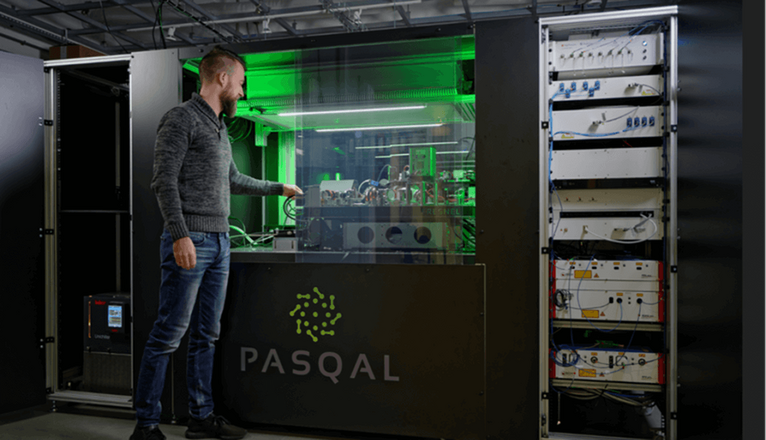Pasqal, the French start-up that has emerged as the flag-bearer for neutral-atom quantum computing, is cementing its North-American presence with a pair of closely linked announcements: the company has agreed to supply a 100-qubit quantum processing unit (QPU) to Distriq – Quantum Innovation Zone, and it has begun fitting out a 50,000 sq ft manufacturing facility in Sherbrooke, Québec that will produce the next generation of its machines.
Taken together, the news signals both a deepening commercial market for Pasqal’s hardware and a deliberate push by the province of Québec to anchor a domestic quantum-technology supply chain.
The Sherbrooke plant, located in the Espace Quantique 1 complex, is Pasqal’s second factory worldwide and its first outside Europe. When fully ramped, the line will assemble neutral-atom QPUs that slot into the company’s modular control architecture and scale to the several-hundred-qubit range targeted by Pasqal’s 2025-road-map. The site’s build-out is backed by a CA$15 million (US$11 million) loan from Investissement Québec announced last year and follows the template set by Pasqal’s flagship plant in Massy, south of Paris.
Company executives say Sherbrooke was selected for its growing concentration of quantum talent, anchored by the Université de Sherbrooke’s Institut quantique, and its proximity to North-American customers that increasingly expect on-shore hardware supply.
Those customers now include Distriq, the provincially designated quantum-innovation zone headquartered in Sherbrooke. Distriq has secured a financing package worth CA$13.2 million to underwrite the QPU purchase: CA$9.6 million in loans from Québec’s Ministry of Economy, Innovation and Energy (MEIE) and Investissement Québec, CA$2.4 million from National Bank of Canada and CA$1.2 million from Canada Economic Development for Québec Regions (CED). Once installed, the 100-qubit system will be made available to academic and industrial users via Distriq’s testbed programme, giving Canadian researchers direct access to a mid-scale neutral-atom machine without trans-Atlantic latency or export-control constraints.
Quantum Tech Moves Beyond the Lab
Neutral-atom architectures, which trap individual rubidium atoms in configurable optical tweezers and rely on Rydberg interactions for entanglement, compete with superconducting and trapped-ion designs in the race toward practical quantum advantage. Pasqal argues its systems offer higher qubit connectivity and are simpler to scale because atoms are identical by nature and do not require nanofabricated qubit circuits. The company has already delivered smaller systems to customers such as EDF, Crédit Agricole CIB and BASF, and recently demonstrated a 324-qubit prototype running quantum-Monte-Carlo workloads.
Wasiq Bokhari, Pasqal’s executive chairman, framed the Distriq sale and the Sherbrooke factory as tangible proof that the technology is moving out of the lab. “These accomplishments tell the market that quantum computing is now a reality rather than a pipe dream,” Bokhari said in a statement, adding that the company is “executing on its industrial strategy” and “delivering real value to customers today.”
For Distriq, the deal is equally strategic. The zone’s vice-president of growth and partnerships, Mehdi Bozzo-Rey, said anchoring a home-grown quantum computer in Sherbrooke will accelerate the development of use-cases aligned with Québec’s industrial base. Target sectors include health-care optimisation, energy-grid modelling, logistics, advanced materials and financial-services risk analysis – all areas where quantum algorithms are expected to outperform classical techniques as hardware scales.
The Sherbrooke plant is expected to create highly skilled engineering and optics positions and to bolster a local supply chain spanning laser systems, cryogenics and control electronics. Pasqal says it remains on track to have phase-one production lines operational by December 2026, synchronised with the delivery timetable for Distriq’s QPU. The company has publicly committed to investing more than CA$3 billion across Southeast-Asia, Europe and North America and aims to have 300 MW of quantum processing capacity deployed globally by the end of 2028.
Quantum Innovation in Quebec
Québec’s government views quantum technology as a pillar of its broader innovation agenda; the province has earmarked CA$100 million for quantum projects over five years and is courting both domestic start-ups and foreign anchor tenants. In parallel, Ottawa’s National Quantum Strategy is injecting CA$360 million into research and commercialisation initiatives across the country. Pasqal’s expansion therefore slots neatly into federal and provincial plans to capture a share of the rapidly evolving quantum economy, forecast by BCG to top US$90 billion in hardware, software and services by 2040.
While the industry still faces formidable scientific and engineering hurdles – error-correction overheads, fabrication yields, and algorithmic maturity among them – the Sherbrooke announcements illustrate a growing appetite for intermediate-scale devices that can tackle classically intractable problems in optimisation and simulation. For B2B technology buyers, the emergence of domestically manufactured neutral-atom systems means shorter supply chains, reduced geopolitical risk and, potentially, earlier access to application-specific quantum accelerators.
With the Sherbrooke factory build-out under way and the Distriq QPU on order, Pasqal has signalled its intent to be a long-term player on the continent. Whether neutral atoms ultimately prevail in the hardware race remains uncertain, but the company’s decision to plant manufacturing roots in Canada suggests that the next phase of quantum-computing competition will be as much about industrial capacity and regional ecosystems as about qubit counts alone.


